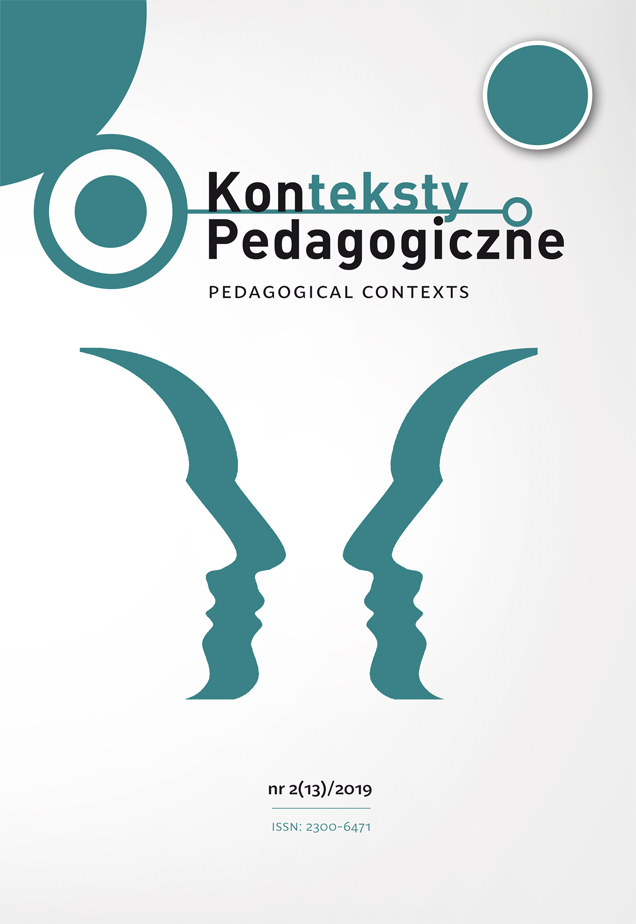Abstract
One of the important tasks of a modern school is to provide psychological and pedagogical assistance to students who experience difficulties. A wide range of dysfunctional behaviors hindering relationships with others may lead to social exclusion of adolescents. An important solution could be the application of art-therapy-based methods in the work with such students, making use of the therapeutic qualities of particular fields of art in the process of influencing their personality and emotional sphere. In the study presented herein, an attempt was made to determine the place of art therapy in solving the problems of teenagers in the opinion of the participants of art therapy classes and their teachers.
References
Bejger, H.A. (2018). Arteterapia i edukacja twórcza w praktyce wychowawczej placówki socjalizacyjnej [Art Therapy and Creative Education in the Educational Practice of a Socialization Institution]. Edukacja Elementarna w Teorii i Praktyce, 2(48), 62–88.
Cortina, M.A. and Fazel, M. (2015). The Art Room: An evaluation of a targeted school-based group intervention for students with emotional and behavioural difficulties. The Arts in Psychotherapy, 42, 35–40.
Khadar, M.G., Babapour, J. and Sabourimoghaddam, H. (2013). The effect of art therapy based on painting therapy in reducing symptoms of oppositional defiant disorder (ODD) in elementary School Boys. Procedia–Social and Behavioral Sciences, 84, 1872–1878.
Konieczna, E.J. (2007). Arteterapia w teorii i praktyce [Art therapy in Theory and Practice]. Kraków: Impuls.
Korbut A. (2016). Arteterapia i jej zastosowanie w obszarze edukacji [Art Therapy and its Application in Education]. Edukacja Elementarna w Teorii i Praktyce, 3(41), 267–280.
Linek, A. (2012). Arteterapia – poznanie i wyrażanie siebie [Art Therapy – Getting to Know and Expressing Oneself ]. Zeszyty Naukowe Towarzystwa Doktorantów UJ. Nauki Humanistyczne, 4(1), 83–94.
Marcinkowska, A. (2013). Arteterapia [Art Therapy]. In: A. Weissbrot-Koziarska and I. Dąbrowska-Jabłońska (eds.), Słownik metod, technik i form pracy socjalnej, opiekuńczej i terapeutycznej [Dictionary of Methods, Techniques and Forms of Social, Welfare and Therapeutic Work] (p. 17), Vol. 2. Opole: Wydawnictwo Uniwersytetu Opolskiego.
Papaj, A. (2010). O kolorach, kształtach, dźwiękach i innych tworzywach arteterapii [On Colours, Shapes, Sounds and Other Components of Art Therapy]. In: Prace Naukowe Akademii im. Jana Długosza w Częstochowie [Research Papers of the Jan Długosz Academy in Częstochowa] (pp. 259–269). Seria: Pedagogika, XIX. Częstochowa: Akademia im. Jana Długosza.
Rozporządzenie ministra edukacji narodowej z 9 sierpnia 2017 roku w sprawie zasad organizacji i udzielania pomocy psychologiczno-pedagogicznej w publicznych przedszkolach szkołach i placówkach (Dz. U. poz. 1591) [Regulation of the Minister of National Education of 9 August 2017 on the principles of organizing and providing psychological and pedagogical assistance in public kindergartens, schools and institutions (Journal of Laws No. 1591, item 1591)].
Skwarek, B. and Szulc, W. (2017). Arteterapia w pracy pedagogicznej [Art Therapy in Pedagogical Work]. Zeszyty Naukowe Państwowej Wyższej Szkoły Zawodowej im. Witelona w Legnicy, 22, 93–107.
Stańko, M. (2009). Arteterapia z dziećmi i młodzieżą – perspektywa rozwojowa [Art Therapy with Children and Youth – Developmental Perspective]. Psychiatria, 2, 66–73.
Wojciechowski, A. (2007). Wszyscy jesteśmy twórcami. Rozważania pedagoga specjalnego i rzeźbiarza [We Are All Creators. Reflections of a Special Needs Tutor and Sculptor], http://www.fidesetratio.org.pl/files/plikipdf/wojciechowskia2.pdf [accessed: 3.10.2019].
In accordance with the recommendation of the Ministry of Science and Higher Education, which aims to counteract the practice of “ghostwriting” and “guest authorship,” all authors submitting their text for publication should attach an author’s statement which declares the contribution of each of the authors to the article. The printed and signed statement should be delivered by mail or other means to editor-in-chief Joanna Skibska or sent in the form of a scan to the following e-mail address: redakcja@kontekstypedagogczne.pl. The authors will not receive remuneration for publishing their papers. The editors reserve the right to make minor editorial changes to the articles which will not affect the substance of the article. We encourage all authors to prepare their articles in accordance with the guidelines for manuscript preparation. Download pdf file.
Authors transfer all copyrights and grant the journal the right of first publication with the work simultaneously licensed under a Creative Commons Attribution License that allows others to share the work with acknowledgement of the work's authorship and initial publication in this journal. All authors agree to the publishing of their email addresses, affiliations and short bio statements with their articles during the submission process.

